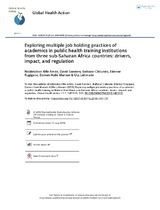| dc.contributor.author | Amde, Woldekidan Kifle | |
| dc.contributor.author | Sanders, David | |
| dc.contributor.author | Chilundo, Baltazar | |
| dc.contributor.author | Rugigana, Etienne | |
| dc.contributor.author | Mariam, Damen Haile | |
| dc.contributor.author | Lehmann, Uta | |
| dc.date.accessioned | 2018-08-21T12:02:28Z | |
| dc.date.available | 2018-08-21T12:02:28Z | |
| dc.date.issued | 2018 | |
| dc.identifier.citation | Amde, W.K. et al. (2018). Exploring multiple job holding practices of academics in public health training institutions from three sub-Saharan Africa countries: drivers, impact, and regulation. Global Health Action, 11(1): 1491119. | en_US |
| dc.identifier.issn | 1654-9880 | |
| dc.identifier.uri | http://dx.doi.org/10.1080/16549716.2018.1491119 | |
| dc.identifier.uri | http://hdl.handle.net/10566/3957 | |
| dc.description.abstract | BACKGROUND: The paper examines external multiple job holding practices in public health training institutions based in prominent public universities in three sub-Saharan Africa countries (Rwanda, Ethiopia, Mozambique).
OBJECTIVE: The study aims to contribute to broadening understanding about multiple job holding (nature and scale, drivers and reasons, impact, and efforts to regulate) in public health training schools in public universities.
METHODS: A qualitative multiple case study approach was used. Data were collected through document reviews and in-depth interviews with 18 key informants. Data were then triangulated and analyzed thematically.
RESULTS: External multiple job holding practices among faculty of the three public health training institutions were widely prevalent. Different factors at individual, institutional, and national levels were reported to underlie and mediate the practice. While it evidently contributes to increasing income of academics, which many described as enabling their continuing employment in the public sector, many pointed to the negative effects as well. Similarities were found regarding the nature and drivers of the practice across the institutions, but differences exist with respect to mechanisms for and extent of regulation. Regulatory mechanisms were often not clear or enforced, and academics are often left to self-regulate their engagement. Lack of regulation has been cited as allowing excessive engagement in multiple job holding practice among academics at the expense of their core institutional responsibility. This could further weaken institutional capacity and performance, and quality of training and support to students.
CONCLUSION: The research describes the complexity of external multiple job holding practice, which is characterized by a cluster of drivers, multiple processes and actors, and lack of consensus about its implication for individual and institutional capacity. In the absence of a strong accountability mechanism, the practice could perpetuate and aggravate the fledgling capacity of public health training institutions. | en_US |
| dc.language.iso | en | en_US |
| dc.publisher | Taylor & Francis | en_US |
| dc.rights | This is an Open Access article distributed under the terms of the Creative Commons Attribution License (http://creativecommons.org/licenses/by/4.0/), which permits unrestricted use, distribution, and reproduction in any medium, provided the original work in properly cited. | |
| dc.subject | Capacity development | en_US |
| dc.subject | Case study | en_US |
| dc.subject | Context | en_US |
| dc.subject | Dual practice | en_US |
| dc.subject | Ethiopia | en_US |
| dc.subject | Higher education | en_US |
| dc.subject | Moonlighting | en_US |
| dc.subject | Mozambique | en_US |
| dc.subject | Public health | en_US |
| dc.subject | Rwanda | en_US |
| dc.title | Exploring multiple job holding practices of academics in public health training institutions from three sub-Saharan Africa countries: drivers, impact, and regulation | en_US |
| dc.type | Article | en_US |
| dc.privacy.showsubmitter | FALSE | |
| dc.status.ispeerreviewed | TRUE | |

